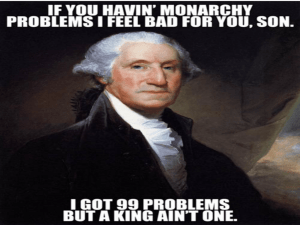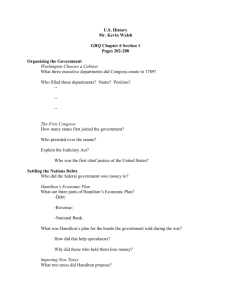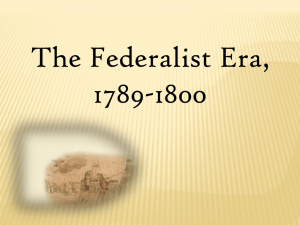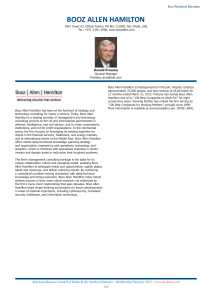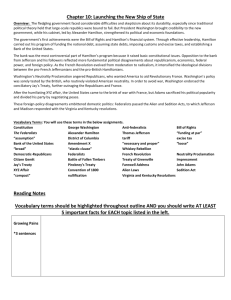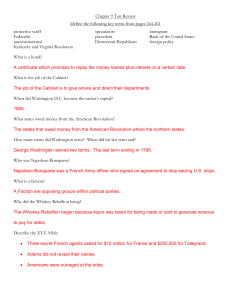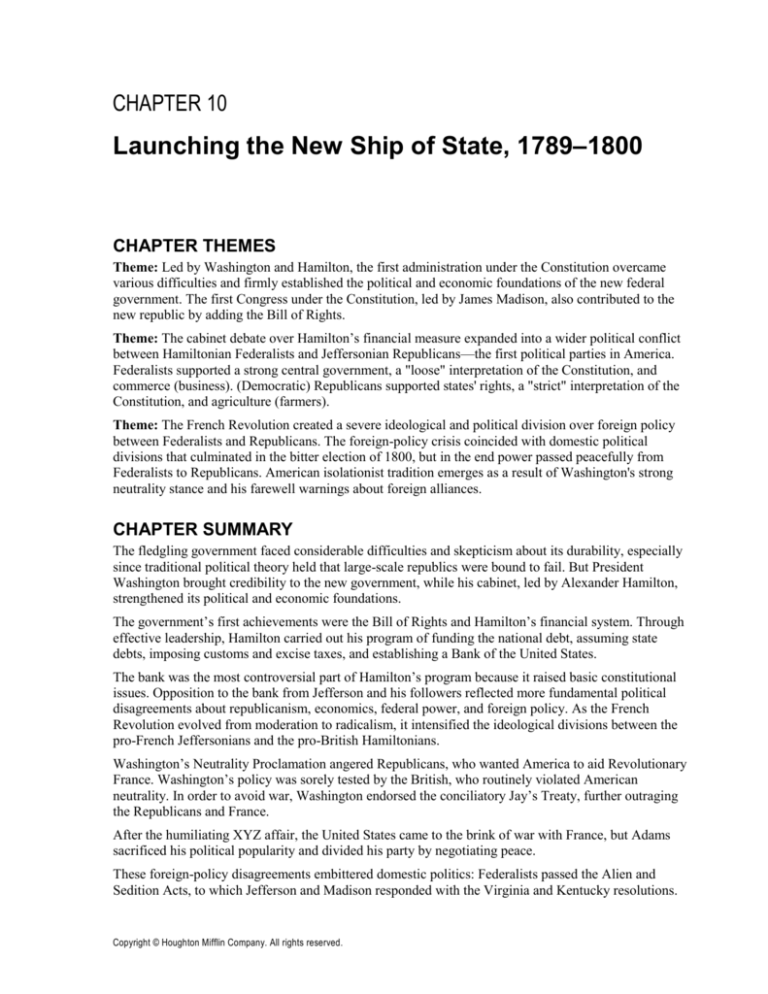
CHAPTER 10
Launching the New Ship of State, 1789–1800
CHAPTER THEMES
Theme: Led by Washington and Hamilton, the first administration under the Constitution overcame
various difficulties and firmly established the political and economic foundations of the new federal
government. The first Congress under the Constitution, led by James Madison, also contributed to the
new republic by adding the Bill of Rights.
Theme: The cabinet debate over Hamilton’s financial measure expanded into a wider political conflict
between Hamiltonian Federalists and Jeffersonian Republicans—the first political parties in America.
Federalists supported a strong central government, a "loose" interpretation of the Constitution, and
commerce (business). (Democratic) Republicans supported states' rights, a "strict" interpretation of the
Constitution, and agriculture (farmers).
Theme: The French Revolution created a severe ideological and political division over foreign policy
between Federalists and Republicans. The foreign-policy crisis coincided with domestic political
divisions that culminated in the bitter election of 1800, but in the end power passed peacefully from
Federalists to Republicans. American isolationist tradition emerges as a result of Washington's strong
neutrality stance and his farewell warnings about foreign alliances.
CHAPTER SUMMARY
The fledgling government faced considerable difficulties and skepticism about its durability, especially
since traditional political theory held that large-scale republics were bound to fail. But President
Washington brought credibility to the new government, while his cabinet, led by Alexander Hamilton,
strengthened its political and economic foundations.
The government’s first achievements were the Bill of Rights and Hamilton’s financial system. Through
effective leadership, Hamilton carried out his program of funding the national debt, assuming state
debts, imposing customs and excise taxes, and establishing a Bank of the United States.
The bank was the most controversial part of Hamilton’s program because it raised basic constitutional
issues. Opposition to the bank from Jefferson and his followers reflected more fundamental political
disagreements about republicanism, economics, federal power, and foreign policy. As the French
Revolution evolved from moderation to radicalism, it intensified the ideological divisions between the
pro-French Jeffersonians and the pro-British Hamiltonians.
Washington’s Neutrality Proclamation angered Republicans, who wanted America to aid Revolutionary
France. Washington’s policy was sorely tested by the British, who routinely violated American
neutrality. In order to avoid war, Washington endorsed the conciliatory Jay’s Treaty, further outraging
the Republicans and France.
After the humiliating XYZ affair, the United States came to the brink of war with France, but Adams
sacrificed his political popularity and divided his party by negotiating peace.
These foreign-policy disagreements embittered domestic politics: Federalists passed the Alien and
Sedition Acts, to which Jefferson and Madison responded with the Virginia and Kentucky resolutions.
Copyright © Houghton Mifflin Company. All rights reserved.
52
Chapter 10: Launching the New Ship of State, 1789–1800
DEVELOPING THE CHAPTER: SUGGESTED LECTURE OR
DISCUSSION TOPICS
Elaborate on the reasons for skepticism about the new government, particularly the view that
factionalism would eventually destroy a republican government that extended over such a large
territory. Show how Washington deliberately acted to assert the durability of the new regime.
REFERENCE: Stanley Elkins and Eric McKitrick, The Age of Federalism: The Early American
Republic, 1788–1800 (1993).
Explain why the French Revolution was such a dangerously divisive world event, even in
America. Point out that part of the disagreement in America was over whether the French were
only carrying out the principles of the American Revolution or whether they were advocating a
more radical doctrine of class conflict.
REFERENCE: Daniel Lang, Foreign Policy in the Early Republic (1985).
Show how the Federalist-Republican conflict over foreign policy embittered domestic politics,
since it raised charges of “disloyalty” on both sides. The Genêt affair, Jay’s Treaty, the quasi-war
with France, and the Alien and Sedition Acts might all be viewed in this light.
REFERENCE: Leonard Levy, Legacy of Suppression (1960).
Consider the Adams-Jefferson contest of 1796 in relation to both foreign- and domestic-policy
disagreements. The focus might be on how, despite the depth of the conflict over issues, the
Federalists and Republicans finally kept their contest within the bounds of peaceful electoral
politics and the shared value of republicanism.
REFERENCE: Lance Banning, ed., After the Constitution: Party Conflict in the New Republic
(1989).
FOR FURTHER INTEREST: ADDITIONAL CLASS TOPICS
Focus on the components of Washington’s image as the central symbol of republican government
and virtue: heroism, integrity, nonpartisanship, reluctance to hold power.
Compare the American political dilemmas presented by the French Revolution with those in the
twentieth century caused by the Russian, Chinese, and Iranian revolutions.
Was George Washington uniquely suited to be a successful first President under the Constitution?
How might the United States be different if Alexander Hamilton were the first President? Thomas
Jefferson? Benjamin Franklin? Consider political ideas, economic issues, and foreign policy.
What other times in American history has liberty been attacked? What situation or conditions
would merit restrictions on liberty? Would they be Constitutional?
Discuss the Alien and Sedition Acts as threats to liberty. Consider especially their relation to the
new, fragile Bill of Rights.
Consider whether the Hamilton-Jefferson conflict was just a “normal” political disagreement like
those between later American political parties or whether it was a more profound ideological
disagreement that really threatened to destroy the new government.
Copyright © Houghton Mifflin Company. All rights reserved.
Chapter 10: Launching the New Ship of State, 1789–1800
53
CHARACTER SKETCHES
George Washington (1732–1799)
As both military leader of the Revolution and first president under the Constitution, Washington
symbolized the republican ideal of Cincinnatus, the Roman citizen-soldier who only reluctantly
abandoned private life to serve his country.
The only serious challenge to Washington’s leadership during the Revolution came in 1777 from the
“Conway cabal,” a group of disgruntled officers, encouraged by some members of Congress, who
plotted futilely to oust Washington from command.
In 1782 some Continental army officers proposed making Washington king of America; he was
outraged when he heard of it and refused to allow anyone to mention the idea in his presence.
During his “retirement” from 1783 to 1787, his greatest interest was in linking the Potomac and Ohio
rivers by road, and he traveled on horseback 650 miles to examine possible routes.
Quote: “My movements to the chair of government will be accompanied by feelings not unlike those of
a culprit who is going to his place of execution.” (1788)
REFERENCE: Garry Wills, Cincinnatus (1984).
Alexander Hamilton (1757–1804)
Hamilton was the political and financial genius of the early Republic whose heroic postures, personal
ambition, and taste for aristocratic government made many of his contemporaries fear him, even though
everyone recognized his great talents.
Born on the British West Indian island of Nevis, Hamilton came to New York at age fourteen to begin
his education. The unfair attacks on him as a “bastard” arose because his mother had not obtained a
legal divorce from her previous husband before establishing her union with Hamilton’s father.
He became Washington’s aide-de-camp in the Revolution and rose to lieutenant colonel. Extremely
hot-tempered and sometimes vindictive, Hamilton denounced Washington behind his back and resigned
from his staff after Washington once rebuked him for lateness.
He feuded with Aaron Burr for years in New York and helped block him from the governorship and,
possibly, the presidency. He tried to avoid Burr’s demand for a duel, but when Burr made Hamilton’s
refusal a matter of public honor, Hamilton reluctantly accepted.
Quote: “The love of fame, the ruling passion of the noblest minds, prompts a man to plan and
undertake extensive and arduous enterprises for the public benefit, requiring considerable time to
mature and perfect them.” (Federalist No. 72, 1788)
REFERENCE: Gerald Stourzh, Alexander Hamilton and the Idea of Republican Government (1970).
John Jay (1754–1829)
Jay was one of the authors (with Madison and Hamilton) of the Federalist Papers. His negotiation of
Jay’s Treaty with Great Britain in 1795 made him a hero to Federalists and a hated symbol of American
humiliation to Jeffersonian Republicans.
Although somewhat humorless and vain, Jay had a very high sense of honor. At King’s College
(Columbia) he was once temporarily suspended for refusing to reveal the name of a fellow student who
had committed vandalism.
Copyright © Houghton Mifflin Company. All rights reserved.
54
Chapter 10: Launching the New Ship of State, 1789–1800
Washington offered him his choice of any position in the new government, and Jay chose chief justice
of the United States. He carefully cultivated influential British citizens during the negotiation of the
commercial treaty with Britain in order to obtain the most favorable terms, but to the Republicans who
burned him in effigy, these contacts were proof that he had sold out American interests.
Quote: “Further concessions on the part of Great Britain cannot, in my opinion, be attained. If this
treaty fails, I despair of another.…If I entirely escape censure, I shall be agreeably disappointed.”
(Letter, 1795)
REFERENCE: Richard B. Morris, John Jay (1975).
John Adams (1735–1826)
Adams was the Massachusetts Revolutionary and Federalist president whose public appeal never
matched his political and intellectual talents.
He originally considered becoming a minister, but “frigid John Calvin” repelled him, and he turned to
law. During his frequent missions abroad, he lived very frugally and constantly complained of the
“extravagance” of his fellow diplomats like Franklin and Jay.
He thought that Hamilton maneuvered to get him elected to the vice presidency, which he called “the
most insignificant office that ever the invention of man contrived or the mind of man conceived.”
Although he was prickly and cold in most situations, his diaries and letters to his wife Abigail show his
warm, anxious, and generous side.
He renewed his friendship with Jefferson after both left office, and they exchanged numerous letters
until they died within a few hours of each other on July 4, 1826. Adams’s last words were “Thomas
Jefferson still lives.”
Quote: “My reputation has been so much the sport of the public, for fifty years, and will be with
posterity, that I hold it a bubble, a gossamer, that idles in the wanton summer air.” (Letter to Jefferson,
1813)
REFERENCE: Peter Shaw, The Character of John Adams (1976).
Aaron Burr (1756–1836)
Burr was the vice president of the United States who killed Alexander Hamilton in a duel and then
organized a mysterious conspiracy to separate parts of the West from the United States.
A grandson of Jonathan Edwards, the Great Awakening preacher, Burr was charming and eloquent but
always loved adventure and intrigue. He nearly joined the Conway cabal against Washington and
helped organize the Tammany Hall political club in New York.
After killing Hamilton in the duel on July 11, 1804, he first fled but then returned to preside as vice
president over the impeachment trial of Samuel Chase before embarking on his western conspiracy.
Burr’s plotting was so complicated and confusing that it is still uncertain whether he wanted to set up a
new western nation under himself or to form a private army to invade Mexico. Although technically
acquitted in his treason trial, he was completely disgraced. He fled to France, where he lived in poverty
and tried to get Napoleon to endorse his schemes for an invasion of America.
Quote: “Political opposition can never absolve gentlemen from a rigid adherence to the laws of
honor.…You have indulged in the use of language derogatory to my honor as a gentleman.…To this I
expect a definite reply which must lead to an accommodation, or the only alternative which the
circumstances of the case will justify.” (Dueling challenge to Alexander Hamilton, 1804)
Copyright © Houghton Mifflin Company. All rights reserved.
Chapter 10: Launching the New Ship of State, 1789–1800
55
REFERENCE: Herbert S. Parmet and Marie B. Hecht, Aaron Burr: Portrait of an Ambitious Man
(1967).
GREAT DEBATES IN AMERICAN HISTORY
Great Debate (1791–1801):
Whose political theories and programs are more conducive to creating a strong, free Republic:
Hamilton’s or Jefferson’s?
For Hamilton: The
Federalists—led by Hamilton,
Adams, Jay, Marshall, and
Pickering; including merchants,
urban upper classes and
conservative clergy.
For Jefferson: The
Republicans—led by Jefferson,
Madison, Monroe, and Burr;
including farmers, westerners,
and urban craft workers and
tradespeople.
ISSUE #1: Loose or strict construction. Should the Constitution be interpreted loosely to grant implied
powers to the federal government?
Yes: Federalist Hamilton: “The
means by which national
exigencies are to be provided
for, national inconveniences
obviated, national prosperity
promoted are of such infinite
variety, extent, and complexity,
that there must of necessity be
great latitude of discretion in the
selection and application of
these means. If the end be
clearly comprehended within
any of the specified powers, and
if the measure have an obvious
relation to the end, and it is not
forbidden by any particular
provision of the constitution, it
may safely be deemed to come
within the compass of the
national authority.”
No: Republican Jefferson: “I
consider the foundation of the
Constitution as laid on this
ground—that all powers not
delegated to the United States by
the Constitution, nor prohibited
by it to the states, are reserved to
the states, or to the people. To
take a single step beyond the
boundaries thus specifically
drawn around the powers of
congress is to take possession of
a boundless field of power, no
longer susceptible of any
definition.”
ISSUE #2: Manufacturing versus agriculture. Should urban commerce and manufacturing be promoted
as much as agriculture?
Yes: Federalist Hamilton: “The
spirit of enterprise, useful and
prolific as it is, must necessarily
be contracted or expanded, in
proportion to the simplicity or
variety of the occupations and
productions which are to be
found in a society. It must be
Copyright © Houghton Mifflin Company. All rights reserved.
No: Republican Jefferson:
“Those who labour in the earth
are the chosen people of God, if
ever he had a chosen people,
whose breasts he has made his
peculiar deposit for substantial
and genuine virtue.…Corruption
of morals in the mass of
56
Chapter 10: Launching the New Ship of State, 1789–1800
less in a nation of mere
cultivators, than in a nation of
cultivators and merchants; less
in a nation of cultivators and
merchants, than in a nation of
cultivators, artificers, and
merchants.”
cultivators is a phenomenon of
which no age nor nation has
furnished an example.…
Generally speaking the
proportion which the aggregate
of the other classes of citizens
bears in any state to that of its
husbandmen, is the proportion
of its unsound to its healthy
parts.…The mobs of great cities
add just so much to the support
of pure government, as sores do
to the strength of the human
body.”
ISSUE #3: Should the common people be trusted with government?
No: Federalist Hamilton: “All
communities divide themselves
into the few and the many. The
first are the rich and well born;
the other, the mass of the people.
The voice of the people has been
said to be the voice of God; and
however generally this maxim
has been quoted and believed, it
is not true in fact. The people are
turbulent and changing; they
seldom judge or determine right.
Give therefore to the first class a
distinct, permanent share in the
government. They will check the
unsteadiness of the second; and
as they cannot receive any
advantage by a change, they
therefore will ever maintain
good government.”
Yes: Republican Jefferson:
“Whenever the people are wellinformed, they can be trusted
with their own government;
wherever things get so far wrong
as to attract their notice, they
may be relied on to set them
right.
“I am not among those who fear
the people. They, and not the
rich, are our dependence for
continued freedom.
“The mass of mankind has not
been born with saddles on their
backs, nor a favored few booted
and spurred ready to ride them
legitimately, by the grace of
God.”
ISSUE #4: The French Revolution. Should the United States view the French Revolution with
sympathy and approval?
No: Federalist Hamilton: “The
cause of France is compared
with that of America during its
late revolution. Would to heaven
that the comparison were just.
Would to heaven that we could
discern in the mirror of French
affairs the same humanity, the
same decorum, the same gravity,
the same order, the same
dignity, the same solemnity,
Yes: Republican Jefferson: “I
still hope the French Revolution
will end happily. I feel that the
permanence of our own leans in
some degree on that; and that a
failure there would be a
powerful argument to prove
there must be a failure here.
“My own affections have been
deeply wounded by some of the
martyrs to this cause, but rather
Copyright © Houghton Mifflin Company. All rights reserved.
Chapter 10: Launching the New Ship of State, 1789–1800
which distinguished the cause of
the American Revolution.
Clouds and darkness would not
then rest upon the issue as they
now do. I own I do not like the
comparison.”
57
than it should have failed, I
would have seen half the earth
desolated; were there but an
Adam and Eve left in every
country, and left free, it would
be better than it now is.”
REFERENCES: Richard Buel, Jr., Securing the Revolution: Ideology in American Politics, 1789–1815
(1972); Daniel Lang, Foreign Policy in the New Republic (1985).
QUESTIONS FOR CLASS DISCUSSION
1.
Did the Bill of Rights satisfy the Anti-Federalists concerns? Was individual liberty and state
sovereignty protected by the new amendments? What about assaults on the new Bill of Rights
such as the national bank and the Alien and Sedition Acts?
2.
Why did Hamilton move so rapidly to create large financial commitments by the federal
government? Since we normally think of the “federal debt” as something bad, why did Hamilton
think of it as something good and necessary for the national welfare?
3.
How sympathetic should Revolutionary Americans have been to the king-killing French
Revolution?
4.
Why were political parties viewed as so dangerous by the Founding Fathers? Why did parties
come into being at all, and why did they come to be accepted as legitimate ways to express
political disagreement?
5.
How wise was Washington's insistence on neutrality? What about the fact that, while this foreign
policy stance may not have violated the letter of the alliance with France, it did violate the spirit of
the alliance? Do you agree that, as the authors contend, "self-interest is the basic cement of
alliances"? Does a nation have an obligation to maintain alliances previously established even
when it is no longer in that nation's self-interest?
6.
What role did domestic politics and economic realities play in establishing an American foreign
policy? How should American diplomats interact with European governments? Consider the fact
that some Americans do not want diplomats to follow standard European protocol (like kissing the
Queen's hand or paying bribes to speak to public officials).
7.
Contrast the Hamiltonian Federalist belief that the “wealthy and well educated” ought to run the
government with the Jeffersonian Republican belief that the common person, if educated, could be
trusted to manage public affairs.
EXPANDING THE “VARYING VIEWPOINTS”
John Fiske, Essays Historical and Literary (1902).
A view of the Hamiltonian-Jeffersonian conflict as fundamentally philosophical:
“It may be said that in American politics all men must be disciples either of Jefferson or of
Hamilton. These two statesmen represented principles that go beyond American history,
principles that have found their application in the history of all countries and will continue to do
so.…The question always is how much authority shall the governing portion of the community be
allowed to exercise, to how great an extent shall it be permitted to interfere with private affairs, to
take people’s money in the shape of taxes, whether direct or indirect, and in other ways to curb or
restrict the freedom of individuals.…Now if we compare parties in America with parties in
Copyright © Houghton Mifflin Company. All rights reserved.
58
Chapter 10: Launching the New Ship of State, 1789–1800
England, unquestionably the Jeffersonians correspond to the Liberals and Hamiltonians to the
Tories. It is, on the whole, the latter who wish to enlarge the powers of government.”
Charles Beard, Economic Origins of Jeffersonian Democracy (1915).
A view of the Hamilton-Jefferson dispute as fundamentally economic:
“The spokesmen of the Federalist and Republican parties, Hamilton and Jefferson, were
respectively the spokesmen of capitalistic and agrarian interests.…The party of opposition to the
administration charged the Federalists with building up an aristocracy of wealth by the measures
of government and appealed to the mass of the people, that is, the farmers, to resist the exactions
of a ‘moneyed aristocracy.’ By the ten years’ campaign against the ruling class, they were able to
arouse the vast mass of the hitherto indifferent voters and in the end swamp the compact minority
which had dominated the country.”
QUESTIONS ABOUT THE “VARYING VIEWPOINTS”
1.
What does each of these views see as the basic issue between the Hamiltonians and Jeffersonians?
2.
How does each of them explain the extension of the Hamilton-Jefferson dispute into a sustained
party conflict?
3.
How would each of them explain the conflict over Hamilton’s Bank and governmental support for
business?
Copyright © Houghton Mifflin Company. All rights reserved.




